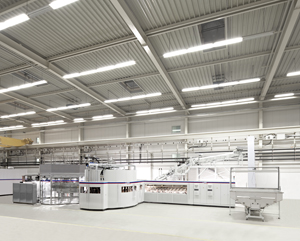The introduction of the TFS candle filter (Twin Flow System) in the spring of 2002, marked a significant advance in terms of precoating filtration’s equipment design and process engineering. Since then, more than 100 TFS filter systems have gone into operation worldwide. This article examines the empirical feedback obtained for the TFS filter system from both a technological and cost-efficiency viewpoint. The capital investment pays for itself within two to three years, thanks to the savings achieved in processing materials, water and energy compared to conventional precoating filters. With the TFS system, state-of-the-art precoating filtration is technologically future-compatible, in that it can be changed over at any time quite simply to alternative filtering aids like regenerative pulps or plastic granules.
In 1994 a Bohrer crate washing machine was delivered to Spa Monopole in Belgium. In 2009 the producer of mineral water started looking for a new one. It was quite clear from the beginning that it should be a Bohrer type TW again. Why change a well-proven system?
Heretofore, control of all multilane buffer runs in beverage filling plants has been based on measuring the buffer fill level using tailback switches. This method of control has proven itself, however it has some disadvantages. As a result, a sensor system that enables a new control concept has been developed at the Faculty of Food Packaging Equipment in cooperation with werner nophut GmbH.
In 2005, the R&D department of Comac Group developed new technologies for keg filling. The resulting HS6T keg lines include process plants like CIP systems and flash pasteurizers with nominal outputs up to 500 hl/h and provided with high quality components (APV, Alfa Laval, GEA Tuchenhagen).
Words like ‘sustainability’, ‘green production’ and ‘corporate social responsibility’ have long since entered the vocabulary of beer marketing strategists and brewery suppliers. Thanks to changes in people’s values and attitudes towards the environment, what was until recently reserved for only a minority of somewhat ridiculed organic producers is now seen more and more as an essential component of company guidelines. Against this background and the requirement to set new standards in depth filtration, Becopad was introduced around two years ago.
Hygienic Design is a major criterion for a company’s competitiveness. Optimizing consumer protection is always the most important aim when implementing Hygienic Design. Another aspect concerns protecting the health of the workforce in production companies. From an economic perspective, Hygienic Design not only pays off because microbiological risks are eliminated, but also because it means machines and their components can be cleaned quickly and easily. Short cleaning cycles are directly reflected in longer production time and, ultimately, in the increased efficiency of plant engineering. This article gives examples of what successful Hygienic Design can look like in practice in beverage filling technology.
Filtration is an important process step in breweries. It removes turbidigens such as tannins, proteins and protein components, yeast cells and the like from the beer. Process engineering in the filter cellar of breweries makes a major contribution to shelf life and taste and thus to the commercial success of a beer. Depth filtration using kieselguhr has a good filtering effect, but the abrasive nature of kieselguhr places special requirements on flow measurement equipment. These requirements can be met very well with instruments based on the clamp-on principle.
Since its launch to the market, countless beverage companies have been convinced by KHS’ InnoPET BloFill stretch blow molder/filler monoblock system. For in addition to specifically saving on the cost of an air conveyor and decreasing the space requirements by eliminating the need for an air conveying segment, the system also has the advantage of gentler PET bottle handling.
Regardless of the current economic crisis, the reality of the matter is that the German brewing industry has reaped the advantages of globalization. What’s more, some breweries have not only been able to compensate for the continuing drop in domestic sales but, in some cases, actually increase sales. Without doubt, globalization has also provided pportunities for some breweries to remain in business. In the pursuit of more affordable keg packaging, a number of disposable alternatives are now available. Here, Lightweight Containers BV, the Dutch marketing and sales subsidiary of KeyKeg, shares its experiences using the KeyKeg.
Bottle design is an essential element of a brewery’s brand presentation for consumers. Bottles of different shapes and colors with embossing and other decorative motifs have come into favor as a means of enhancing a brewery’s image and its brands. Furthermore, such bottles visually set a brand apart from its competitors’ brands and draw attention to the product on the store shelf. Both large and small breweries are choosing to highlight the individuality of their products with unique glass bottles.
Dimensioning of glass and PET returnables filling plants is oftentimes still based on a staging of individual units that are not output-adjustable or adjustable only in steps. With up-to-date control techniques, it is possible to have stepless demand-based control of all individual units in the wet




